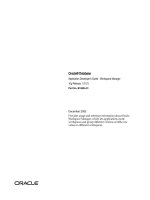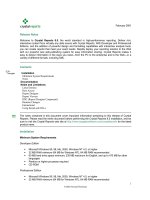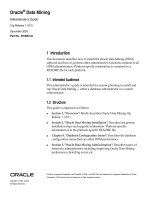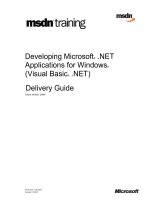Oracle 10g Client Release notes for Windows WW
Bạn đang xem bản rút gọn của tài liệu. Xem và tải ngay bản đầy đủ của tài liệu tại đây (157.35 KB, 8 trang )
Copyright © 2004, Oracle. All
rights reserved.
Oracle is a registered trademark of Oracle Corporation and/or its affiliates. Other names may be trademarks of their respective owners.
Oracle® Database
Client Release Notes
10g Release 1 (10.1.0.2.0) for Windows
Part No. B12179-01
March 2004
These Release Notes contain important last minute information not included in the
Oracle Database documentation library. They may also contain information
regarding components that are no longer installed with the database.
This document contains these topics:
■
Documentation Accessibility
■
Accessibility Software Recommendations
■
Documentation
■
Location of README Files
■
Microsoft Active Directory Support
■
New Features
■
Components Requiring Separate Installations
■
Desupported Components
■
Open Bugs and Known Issues
■
Documentation Corrections and Additions
1 Documentation Accessibility
Our goal is to make Oracle products, services, and supporting documentation
accessible, with good usability, to the disabled community. To that end, our
documentation includes features that make information available to users of
assistive technology. This documentation is available in HTML format, and
contains markup to facilitate access by the disabled community. Standards will
continue to evolve over time, and Oracle is actively engaged with other
market-leading technology vendors to address technical obstacles so that our
documentation can be accessible to all of our customers. For additional
information, visit the Oracle Accessibility Program Web site at
/>Accessibility of Code Examples in Documentation
JAWS, a Windows screen reader, may
not always correctly read the code examples in this document. The conventions
for writing code require that closing braces should appear on an otherwise empty
line; however, JAWS may not always read a line of text that consists solely of a
bracket or brace.
2
Accessibility of Links to External Web Sites in Documentation
This documentation may
contain links to Web sites of other companies or organizations that Oracle does
not own or control. Oracle neither evaluates nor makes any representations
regarding the accessibility of these Web sites.
2 Accessibility Software Recommendations
Our goal is to make Oracle products, services, and supporting documentation
accessible to the disabled community. Oracle Database 10g release 1 (10.1.0.2.0)
supports accessibility features. To make best use of these accessibility features,
Oracle recommends the following software configuration:
■
Windows 2000 with Service Pack 2 or higher
■
Sun Java Access Bridge 1.0.3 (included with the Oracle Database 10g release 1
(10.1.0.2.0) media)
■
JAWS screen reader 3.70.87
■
Microsoft Internet Explorer 5.5 or above
Additional accessibility information for Oracle products can be found at
/>For the latest configuration information, and for information on addressing
accessibility and assistive technology issues, see the Oracle Accessibility FAQ at
/>3 Documentation
Documentation for Oracle Database 10g release 1 (10.1.0.2.0) is available at
/>4 Location of README Files
Additional component README files are accessible after installation. They are
located in:
■
ORACLE_BASE\ORACLE_HOME\doc
■
ORACLE_BASE\ORACLE_HOME\relnotes
■
Product subdirectories in directory ORACLE_BASE\ORACLE_HOME
5 Microsoft Active Directory Support
Microsoft Active Directory is supported with Oracle Database 10g release 1
(10.1).
See Also:
"Using Oracle Database with Microsoft Active
Directory" in PDF format at
/>upport_10g.pdf and in HTML format at
/>ADsupport_10g.htm
3
6 New Features
This section describes new features of Oracle Database for Windows that are not
documented elsewhere.
6.1 New Oracle C++ Call Interface Libraries Available for Windows
New Oracle C++ Call Interface (OCCI) libraries are available for Microsoft CRT
debugging and for developing applications with Microsoft Visual C++ 7.0 .NET
2002 and Microsoft Visual C++ 7.1 .NET 2003.
6.1.1 Support for Debug Version of Microsoft Visual C++ 6.0
Applications that are linked with MSVCRTD.DLL (debug version of Microsoft
C-Runtime) in order to debug memory issues should link with
oraocci10d.lib and oraocci10d.dll. These files are for use with Microsoft
Visual C++ 6.0. The installed location is ORACLE_BASE\ORACLE_HOME\oci\
lib\msvc\vc6.
6.1.2 Support for Microsoft Visual C++ 7.0 .NET 2002
Applications developed in Microsoft Visual C++ 7.0 .NET 2002 should use
oraocci10.lib and oraocci10.dll. The currently shipped OCCI DLL is
built with Microsoft Visual C++ 6.0 and cannot be used from a Microsoft Visual
C++ 7.0 .NET 2002 compiled application. This OCCI library links with the
non-debug version of Microsoft CRT (MSVCR70.DLL). The installed location is
ORACLE_BASE\ORACLE_HOME\oci\lib\msvc\vc7
6.1.3 Support for Debug Version of Microsoft Visual C++ 7.0 .NET 2002
Applications that are linked with MSVCR70D.DLL (debug version of Microsoft
C-Runtime) in Microsoft Visual C++ 7.0 .NET 2002 in order to debug memory
issues should link with oraocci10d.lib and oraocci10d.dll. The installed
location is ORACLE_BASE\ORACLE_HOME\oci\lib\msvc\vc7.
6.1.4 Support for Microsoft Visual C++ 7.1 .NET 2003
Applications developed in Microsoft Visual C++ 7.1 .NET 2003 should use
oraocci10.lib and oraocci10.dll. The currently shipped OCCI DLL is
built with Microsoft Visual C++ 6.0 and cannot be used from a Microsoft Visual
C++ 7.1 .NET 2003 compiled application. This OCCI DLL links with the
non-debug version of Microsoft CRT (MSVCR71.DLL). The installed location is
ORACLE_BASE\ORACLE_HOME\oci\lib\msvc\vc71.
6.1.5 Support for Debug Version of Microsoft Visual C++ 7.1 .NET 2003
Applications that are linked with MSVCR71D.DLL (debug version of Microsoft
C-Runtime) in Microsoft Visual C++ 7.1 .NET 2003 in order to debug memory
issues should link with oraocci10d.lib and oraocci10d.dll. The installed
location is ORACLE_BASE\ORACLE_HOME\oci\lib\msvc\vc71.
4
7 Components Requiring Separate Installations
Some components are no longer installed with the Oracle Database software. A
list of installation changes is provided in Oracle Database Installation Guide for
Windows.
In addition to that list, Oracle Database 10g release 1 (10.1) includes Oracle
Internet Directory client tools, but not Oracle Internet Directory server
components. The latter ship with Oracle 10g Application Server. If the Oracle
Internet Directory client tools are needed for Oracle Database components, then
they must be run from an Oracle 10g Application Server installation.
The Oracle Internet Directory client tools are the LDAP command-line tools, the
Oracle Internet Directory SDK, and Oracle Directory Manager. The Oracle
Internet Directory server components include the directory server, the directory
replication server, the directory integration server, and various tools for starting
and stopping them.
8 Desupported Components
The following components are desupported in this release:
■
INTYPE File Assistant (IFA)
■
Pro*COBOL 1.8.77
■
Oracle Names
■
Oracle Trace
Note:
The current Oracle C++ Call Interface library for
Microsoft Visual C++ 6.0 is available as in previous releases.
■
oraocci10.lib is available in ORACLE_BASE\
ORACLE_HOME\oci\lib\msvc.
■
oraocci10.dll is available in ORACLE_BASE\
ORACLE_HOME\bin.
■
Copies of these two files are also installed in ORACLE_BASE\
ORACLE_HOME\oci\lib\msvc\vc6.
Note:
Ensure that the LIB and PATH environment variables are
set appropriately for the Visual C++ compiler version being
used. For example, if you are using Visual C++ 7.0, then add
directory ORACLE_BASE\ORACLE_HOME\oci\lib\msvc\vc7
to the LIB and PATH variables. Environment variables can be set
from the Windows Control Panel or using the SET command.
See Also:
"Additional Software Installations" in Oracle Database
Installation Guide for Windows
5
9 Open Bugs and Known Issues
This section describes bugs and known issues for Oracle Database for Windows:
■
Installation on Windows 2000 with Service Pack 4
■
User Threads
■
Readme Text Files
■
Oracle Net Configuration Assistant and Active Directory
■
Oracle Net Manager and Active Directory
■
Quick Tour Not Available in Oracle Change Management Pack
■
Error When Viewing Period SQL Execution Plan in Korean
■
NTS Authentication Failure with .NET Remote Objects
9.1 Installation on Windows 2000 with Service Pack 4
Oracle Universal Installer may appear and then disappear on Windows 2000
with Service pack 4. This is because of an underlying JRE bug. There are three
workarounds, depending on what you are installing.
For an Enterprise Manager Grid Control installation, run
install\setup.exe -J-Dsun.java2d.noddraw=true
For an Oracle Database installation, run
install\setup.exe -J-Dsun.java2d.noddraw=true
For a Cluster Ready Services installation, run
install\setup.exe -J-Dsun.java2d.noddraw=true
-Doracle.installer.formCluster=true
9.2 User Threads
Oracle Database Platform Guide for Windows discusses "User Threads", a new
feature of Oracle Database for Windows. This new feature is available in the
64-bit version of Oracle Database, which Oracle plans to release at a later date. It
is not available in the current 32-bit release of Oracle Database for Windows.
9.3 Readme Text Files
Some Readme text files contain Unix line breaks. If you simply double-click these
files, they will open in Notepad by default, and Notepad does not recognize Unix
line breaks. Use write.exe or edit.com instead.
9.4 Oracle Net Configuration Assistant and Active Directory
If you use Oracle Net Configuration Assistant to complete directory access
configuration with Active Directory, and the Active Directory server already has
an Oracle Context, then select the following non-default radio button:
■
Select the directory server you want to use, and configure the directory
server for Oracle usage. (Create or upgrade Oracle Schema and Oracle
Context as necessary.)









